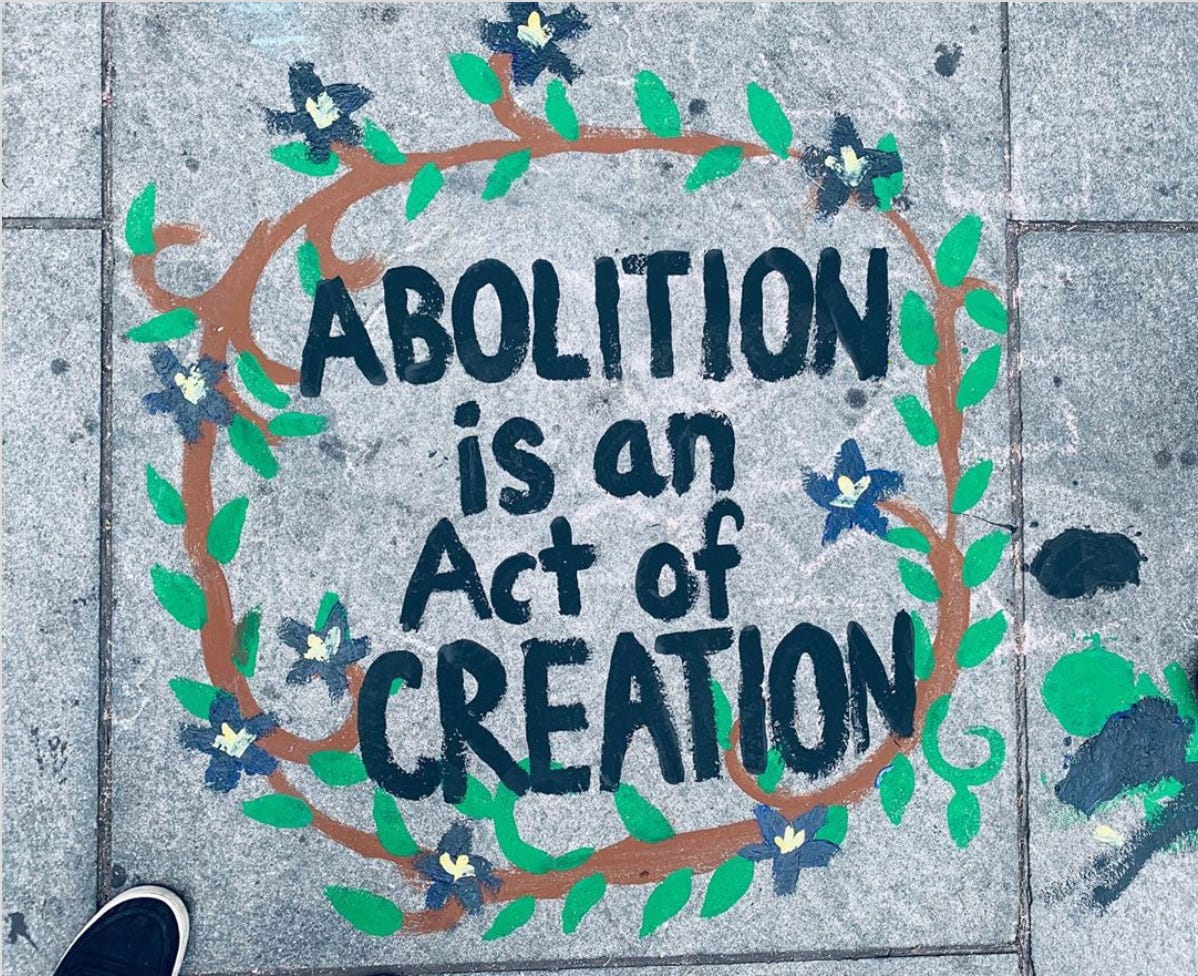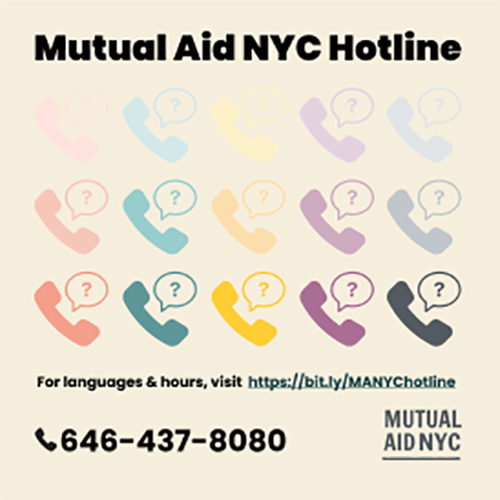A Conversation with Vocal-NY’s Tatiana Hill
Tatiana Hill is a dynamic organizer who has been at the forefront of the movement for Black lives, most notably leading the NYC city hall encampment alongside her fellow organizers at Vocal-NY. She has long been engaged in grassroots organizing and mutual aid work. At the Communications Workers of America Union (CWA), Tatiana was able to combat workplace violence and become a leader for Brooklyn’s working class community. She later co-organized the first workers’ union at Verizon Wireless with her friend Bianca, seeking to create an equitable and just workplace. We spoke to Tatiana on July 11th about her organizing journey, the city hall encampment, her expansive work with Vocal-NY, and the multifaceted challenges of organizing amid COVID-19 while being a Black woman directly impacted by the prison industrial complex.
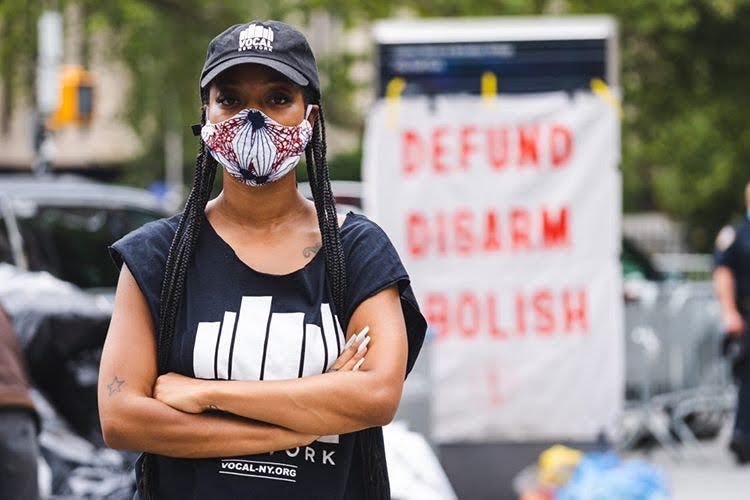
Mutual Aid NYC (MANYC): What drew you to organizing and specifically Vocal-NY?
Tatiana Hill: When I sought CWA out, I actually started working for them because I was so into it, and because I was a leader, naturally, and I was not afraid to use my voice. I think that’s what brought me to organizing in general — I am a person who’s very comfortable with being outspoken but also wanting fair treatment for people around me who don’t speak up for themselves, people who don’t have a voice.
What happened with Vocal was I was personally impacted by the mass incarceration system. My partner was locked up, and everything was uprooted. So I came back to New York. This is where my family’s from, where I grew up. And when I came back here, I reached out to people who my friend Bianca told me about at Vocal. She knows people that were here, and she loves the work that they do. And she told me I probably would like it as well. So I said, “Okay, I’ll try it out,” and I looked them up.
They do work on directly-impacted folks in mass incarceration — which was obviously something I was passionate about — and homelessness, which myself and many other people I know like me growing up have experienced in some way or the other, even if we don’t call it that. Vocal also does work on HIV and AIDS, which is also something a lot of people close to me have experienced and just poor people — Black people in general — are more directly impacted by than anyone else.
I was amazed by their work, and I wanted to be a part of it, I loved it. So I went for the job, and I got it, and they loved me too; they liked my background, they liked my personality. I fit in with them as a family, as a team. I already had a lot of the ideals that they teach and project, but I also learned a lot too. I learned about harm reduction; that was a new thing for me. And now I’m very well read on it and understand the principles of it, but originally, I didn’t know like a lot of folks. It’s a new phenomenon. So I’ve grown and learned so much in this position.
MANYC: Do you feel that learning about harm reduction gave you the language to understand how to de-escalate certain situations?
TH: Absolutely. So the way we have these four unions, my work is in mass incarceration. I work with people who have been in prison, in jail or who are currently in it. Sometimes they even write to me. I’m big on language, like how we label folks, how we speak to them, the type of presence we give them in our spaces as a community, because they are the community […] We want to respect them as human beings and people who are just like us. We’re all one incident away from any of these things being our reality.
I speak of that often when I speak to the groups that I work with, when I do teach-ins and political education. Because sometimes even in those groups, there’s stigma around the others. And that’s a big part of the population that we work with at Vocal are those with stigma. And that covers heavily on these folks, and it is a reason why we as a world and an American nation, we don’t talk about these things openly. We don’t seek the help that we need. We don’t have conversations with people who are going through very similar things as us because there’s stigma. And the stigma exists within us individually. We have to work to remove it, so that we can work through these issues as a community.
MANYC: Roughly how many people would you say Vocal-NY currently serves?
TH: Our membership is around 4,000, I believe. It comes and goes. People go through things in life. Some of our members are very active, some are not. Some of them are leaders, which are the most active members. But our database, we have like 4,000-plus people that we can reach.
We believe housing is a human right. This country does not.
MANYC: Can you tell me about the food pantry and medical services that Vocal provides?
TH: So at Vocal’s office, we don’t have a food pantry, per se, but we do offer meals every day. We have a drop-in center. That’s where our harm reduction education happens. That’s where we have a syringe exchange program as well. At the center, we offer food—lunch, during the day, and we have coffee, other drinks, that kind of thing. People do make donations, and we give them out to our participants. That drop-in center is for people who use drugs, so they do sign in, they get a membership card. So that way if they’re stopped by police and they have a syringe on them, they have a membership card and then they can come in for meals, use the bathroom, that kind of thing.
At Occupy City Hall, we did have a food pantry and food services. So what happened was organically we had people who wanted to volunteer. People brought tons of food on a daily basis. They brought cooked food, they brought canned food, they brought pizza, deliveries. We had breakfast being delivered every day, lunch and dinner — constantly. At times there was a surplus, you know we had snacks, anything you could think of. There was a pantry we called the bodega which was really cool. Anything you would maybe buy at a store you could find. You had bug repellent, sunscreen, plenty of sanitizer, PPE, we had masks. We had feminine hygiene products, we had a bookstore at one point, we had a charging station.
When I say the community came together and provided for one another, they stepped up in a huge way. Any and everything needed, we made lists daily of what was needed and people brought it immediately.
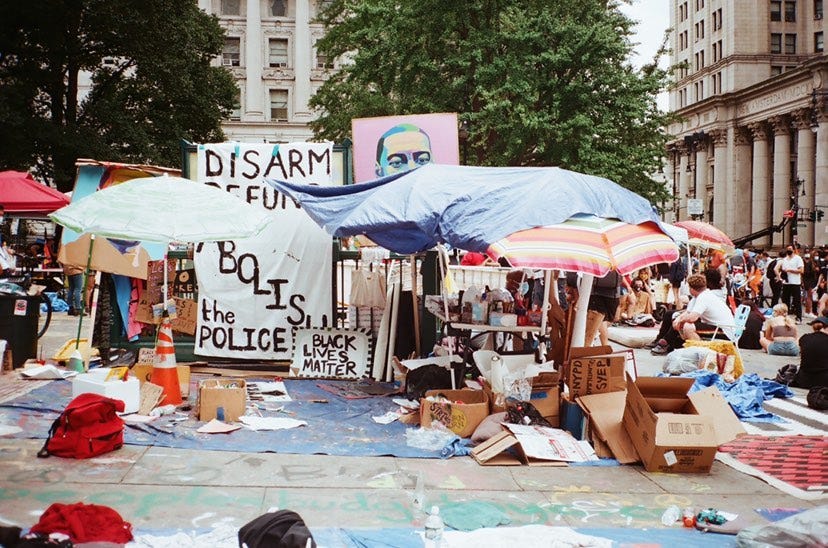
Mutual Aid stations set up by organizers at City Hall | Photograph by Via Wohl
MANYC: Were there any challenges that arose at the encampment?
TH: Yes, in any space like this, there are challenges, especially when you’re looking at a space where we’re saying we don’t need police. We’re going to learn how to work as a community and live together. There are people that are angry and frustrated that came into these spaces. There are people who have never organized before, who have never protested until George Floyd, so some are young. Some don’t understand the history of organizing and how protests work. They also have some misguided frustration. So there were some interactions.
We had a de-escalation team, which was really powerful. We talked to people when they were arguing. We were saying, “We don’t need police, guys, you have to learn how to interact. You don’t have to understand each other or like each other. But let’s respect each other.” Respect is the bottom line. There’s no need to get to physical violence, there’s no need to verbally assault one another. We have so much space, let’s spread it out, cool off and learn how to talk. We had a lot of circles in groups where we talked to each other, even with other organizers who didn’t agree with our method of organizing that space.
Even for me as an organizer, I was learning how to deal with things in a more positive way, in a more interactive way. No community, no space is perfect. When people don’t have resources, when they don’t have a way to live, survive, eat and be well, they do resort to crimes of survival, and they also resort to interpersonal violence, because they are frustrated, they are stressed out when you cannot know what’s coming next on your plate for your family.
We believe housing is a human right. This country does not. We have 90,000 homeless people [in NYC], and some of them were in the encampment and we provided for them. Some of them are mentally unwell, they need stability, they need sustainable housing with services that pertain to their needs. This country has abandoned them and that has caused a ripple effect in our communities. They could be well if they had treatment, if they had medications, if they had therapy sessions, if they have food and a roof over their head.
We have a 36x rate of COVID spread in prisons and jails than in nursing homes.
MANYC: To circle back to COVID, how would you say things have changed for Vocal as a result? Are there any distribution challenges that you all are currently facing?
TH: We have had challenges. Initially it was about keeping our center open, how many people could come in. Our drop-in center, as I mentioned, provides a syringe exchange program. They offer kits for people to use drugs safely. We offer testing for Hepatitis C. We connect them with people who test for HIV. So that was hard at first. But we’ve made an awesome system and some of the members, mostly staff, volunteer and go to different neighborhoods with the highest drug use like Brownsville, East New York, South Bronx, and they hand out kits. So we found a workaround through this.
We also normally have meetings once a month and twice a month for leaders. We do them on Zoom now. So we’ve found a way, at first it was a little tricky. It just took some time. Now we’ve utilized social media and technology a lot, and a lot of our members are older so that’s been a challenge. But we’ve gotten there and we’ve done Twitter tutorials, we’ve done Zoom tutorials. So it’s really been working out.
I do, unfortunately, feel like we’ve distanced ourselves from some of our members who we can’t reach, a lot of the homeless population and drug users. They don’t always have a phone. They like to come in and see us in person and they love interactions with human beings. I work with guys in a homeless shelter. I do teachings there. A lot of them I haven’t heard from this whole time because they don’t have a phone. So it’s unfortunate in that sense, but it’s also highlighted the need for community and how we can help folks more with the type of things that they need on a regular basis, the type of connection that we can forge to check in with people and make sure they are okay and have what they need.
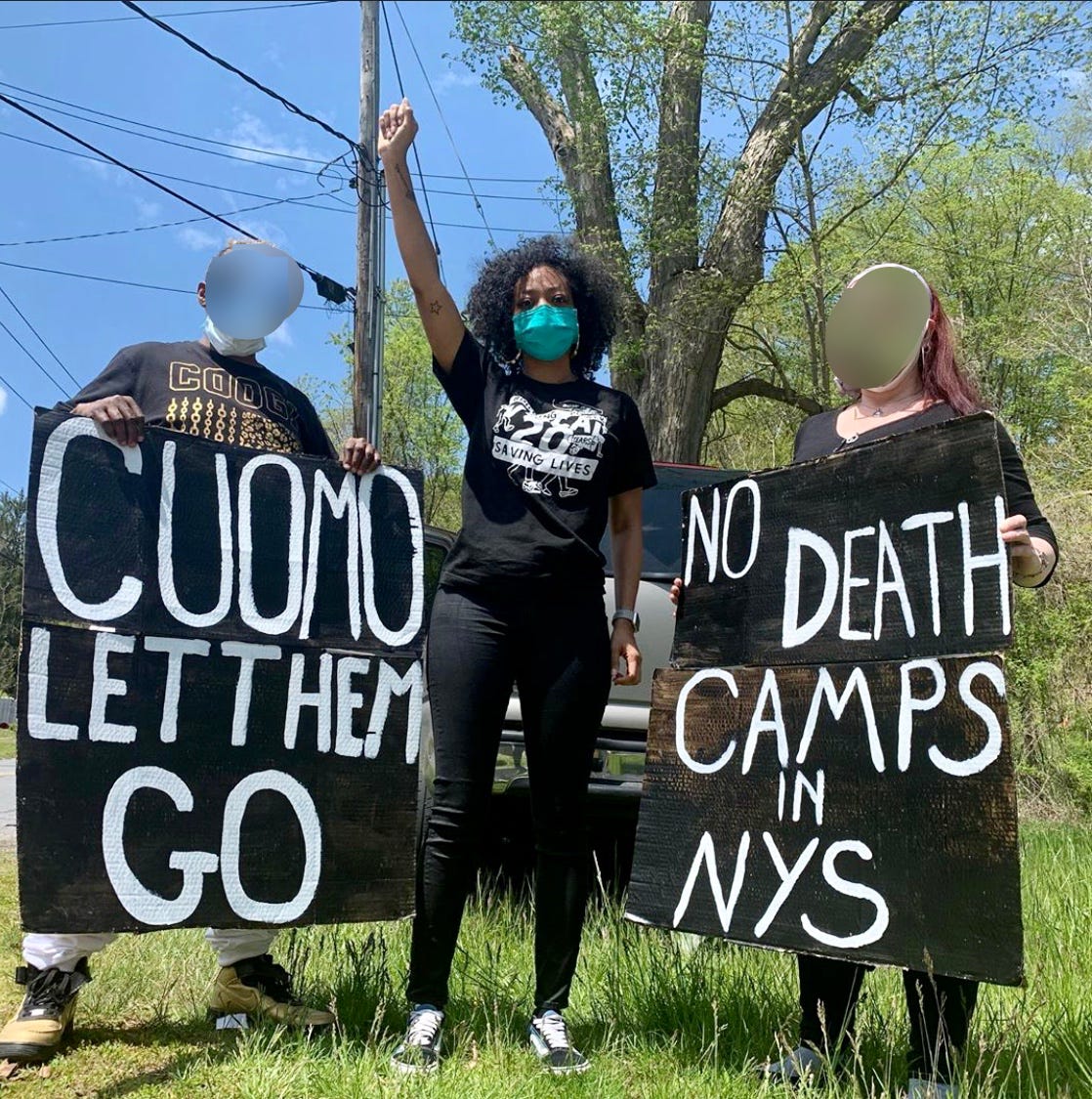
Tatiana Hill with two Vocal-NY leaders at Bedford Hills Correctional Facility for Women | Photo via @tatiana_theactivist
MANYC: What can we expect from Vocal in the coming weeks?
TH: One of our big campaigns that I was doing before the George Floyd protests started was called Free Them All. We have a 36x rate of having COVID spread in prisons and jails than in nursing homes. Our nursing homes aren’t the worst places, it’s actually jails and prisons. So Melinda Katz, the Queens District Attorney, promised to get these high-risk folks out with health issues and those who are elderly. She hasn’t done that. So we’re holding her accountable for that as well as wrongful convictions.
The civil rights union, the union that I work with, we have worked on a bill for wrongful convictions. There’s a man named Robert Majors, he spent over 20 years in prison. There was evidence that has not been presented yet to prove him innocent, and they’ve withheld that evidence for years. So now, we are demanding that Melinda Katz free him. He’s proven innocent, but now they’re trying to make him go back to court, to go through that system again. So we’re holding her accountable for those things.
We also want to repeal the Walking While Trans bill. People who are transgender and sex workers are more impacted by police officers and being detained than other groups. We’re calling for justice. And we also want to pass the HALT solitary bill which aims to end solitary confinement. We’re also pushing our Elderly Fair and Timely parole bill that we work to pass with our group called RAPP (Release Aging People in Prison).
I feel like these people could be my boyfriend, my dad, my uncle, my neighbor. It hurts me to see that my people, Black people, are suffering the most.
MANYC: This work is super hard. How do you deal with burnout and things like that?
TH: I’m very big on self care. I also consider myself to be an empath. I take on these emotions that I deal with with my community and my crew members. I cry a lot, even at work. My coworkers know it, I cry. When I deal with people who have these stories about being arrested, being imprisoned, I can connect with them. I feel like these people could be my boyfriend, my dad, my uncle, my neighbor. It hurts me to see that my people, Black people, are suffering the most. But I deal with it by doing self-care things, like I’ll take a day off sometimes.
Vocal is awesome with offering personal days and mental wellness days because they know this work is heavy. It’s very heavy on your spirit. But I pray often, and I feel like I’m doing the right thing. And I’m bringing joy, I’m bringing knowledge, I work with compassion when I do my work. And people always tell me, “Oh, my gosh, you know, I appreciate you, I thank you. You’re a voice for us who cannot speak.” So even when it gets tough, those are the moments that kind of reinvent my strength in this work.
Homelessness, incarceration are real to me. It’s not something I’m just like, “Oh, I could look at that, and then go home to my little cozy place,” like no. I am in a space where these things could very much impact me again […] And even incarceration; I’m calling a person who’s incarcerated every day. I’m not far removed where I could just disassociate. But, for the most part, all these people who I help reassure me that I’m doing the right thing and that I’m in the right space. And this was where I was meant to be, and doing what I’m meant to do.
MANYC: Being a Black woman, we are empaths like you said. We are the backbone, so can you speak about being a Black woman in this movement? Because there’s so much that we’re fighting on top of these immediate issues.
TH: Since I was young, I’ve seen all of the Black women around me fight for their families, fight for their community, fight for their world. Slavery has been on the backs of us as Black women. We always held our families down and bore the brunt of abuse.
They always say the Black woman is the lowest on the totem pole, the most disrespected. But I feel we are also the life of this earth. We have the gene that creates every single look you can have in this world. We are the strongest and sometimes I hate that we have to say ‘strong’ as a compliment for us. It’s frustrating, but we are that. I am that. You are that, my mother, my grandmother, I’ve seen the embodiment of what strength is through Black women.
And I never put down my Black brothers but I do respect and idolize our women because we deal with the most with a smile on our face. We raise these children when the system rips away the fathers. We rise and shine above every and anything. And we still have so much strength and power and love. Our life strength comes from nurturing.
I think Black women are the epitome of beauty, strength and resilience. We have to tell each other, we have to reassure each other and pick each other up and tell each other we’re beautiful […] A lot of this community that we want to build and look like, we got to unlearn a lot of what we have been learning for centuries. These are all things that we internalize and we have to push it out of us and cleanse our spirits and heal and keep putting one another on a pedestal.
That’s part of what this work is for me is telling each other: “You’re not a convict, you’re not a felon, you are a human being. You’re in a system that has purposely put you in this place that you’re at with 1,000 hurdles in front of you to trap you.”
Since I was young, I’ve seen all of the Black women around me fight for their families, fight for their community, fight for their world.
MANYC: Do you have any words of encouragement for younger activists?
TH: I would just say follow your passion and do what you feel is right. And also be open and listen. Don’t judge people who are in different walks of life than you, understand all these issues are intersectional. As Black people, especially Black women, we face a lot of different levels of these oppressions. Especially folks who are queer as well; they have another added layer.
So I just feel in this space, I’m always learning; I think that’s a good thing to do. Always feel open to learning. Don’t think you know everything, because you don’t know anything. And learn from your elders, learn from your ancestors, read from previous social justice workers. Read about previous social justice movements, they’ve taught me a lot too in my studies, and I’m always — literally always — reading a book every week. I watch YouTube videos from other leaders and people who speak on these issues. I love history. That’s my favorite part of this work.
Community is important, reaching out to people, making connections. I love meeting other Black women in this work. I need to learn from other women around me and talk about my experiences. It makes me better. And it makes me feel good to have community, have advice and wisdom from women who’ve been around. I’ve met several women who also have incarcerated partners and I am so grateful because, in the beginning, I thought that I was going to lose it. I was going through so much financially, mentally, emotionally, spiritually — it’s a lot, and more than people know.
I just did a podcast talking about the impact of incarceration on the family and the home. You go through so much that people can’t relate to until they go through it themselves. So it’s really nice to find other women who experience what you have and who can relate to you in your life.
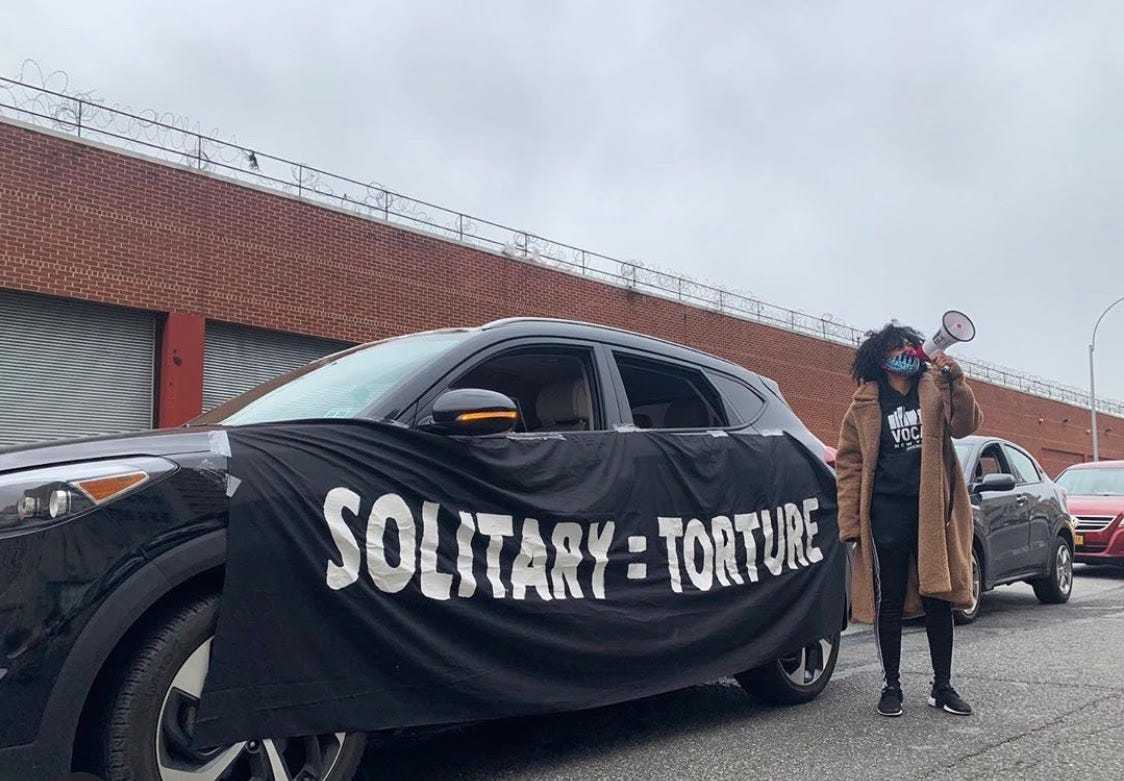
Tatiana Hill protesting at Metropolitan Detention Center | Photo via @tatiana_theactivist
MANYC: Can you describe a moment of joy you have experienced while organizing recently?
TH: I’ve been going to a lot of protests for George Floyd. Several of those protests have been in front of Brooklyn Metropolitan Detention Center. That facility is actually where my partner is incarcerated. So it was really hard for me to come to terms with going in front of a prison where my person is. I’m like, madly in love with him. We had a very happy life before he was arrested and imprisoned.
So it’s hard, but after one of those protests, I got a message from a private random account — a person who’s in there. They’d said, you know, “My wife is out you know she’s free. She told me about your work. I heard about you and I was so happy to hear you, a young sister, is representing us. We don’t have a voice. We’re always silenced. You know, they put us in lockdown. They put us in solitary to silence us. When you guys protest, they lock us down for days.”
And my boyfriend told me the same thing. I already knew it. And I was worried that what we’re doing is damaging them. You always think you’re representing folks and that’s why we like to represent with directly impacted people themselves because you don’t want to speak with somebody in a space thinking that you’re doing the right thing. Vocal is led by our leaders and members. The people make the decisions. They speak. So the guy, he was like, “I thank you so much. I’m so happy to hear y’all out there protesting, we hear you and we thank you.”
That made me cry, like a happy cry. And to hear from a person in prison right now, during COVID, and going through this, thanking me for the work, I’m like, “yeah, this is it.” That reassured me.
After the city’s budget was passed on July 1st, the mission of City Hall park evolved into providing mutual aid to anyone who arrives, rallying and supporting Black Lives Matter protesters, and holding the space as a police-free zone. The effort, now called “Abolition Park,” is heading into its fourth week and it needs your help.
Whether it’s virtual volunteering to help organize food donations; doing research on local service to support social workers at the camp; conducting outreach; showing up at the park by doing a shift with one of the operations groups managing supplies; serving food or offering health services – volunteer to support Abolition Park. The fight for safer communities, justice, and a new world requires long-term solidarity and mutual support.
Urgent Community Update:
Governor Cuomo recently announced the COVID relief rent program to provide eligible households with a one-time rental subsidy. Apply now and spread the word to support neighbors who have been struggling to pay rent as a result of COVID-19.
More Ways to Get Involved + Calls to Action
-
Visit Vocal-NY’s website to learn how to contribute to their drop-in center and learn more about their other services.
-
Register for Vocal’s 2020 gala, a gathering to commemorate people who have donated and participated in Vocal’s work throughout the year. The gala is an opportunity to meet Tatiana and other Vocal organizers, learn about the organization’s work, and join their fight for justice.
-
Join Communities United For Police Reform and #CutNYPDBudget by following these action items on their website. Be sure to also check out their resource collection.
-
Check out the Free Black Radicals Twitter page, a newly formed coalition of Black grassroots organizers Tatiana co-created out of the City Hall encampment who attest to the needs of the community through mutual aid.
-
Text WALK to 50409 to demand New York legislators in Albany repeal the #WalkingWhileTrans Ban bill.
-
Watch notable prison abolitionist Ruth Wilson Gilmore break down the prison industrial complex.
-
Join Housing Justice For All to stop evictions and defend communities. Call governor Cuomo and NYC judges to take action now.
